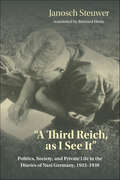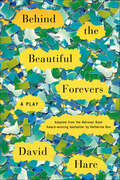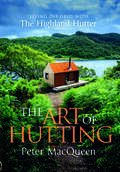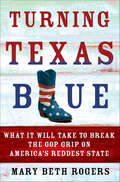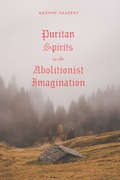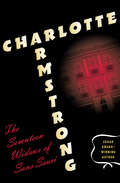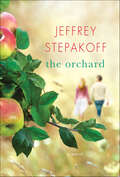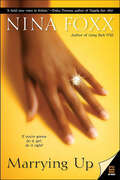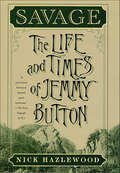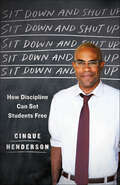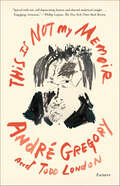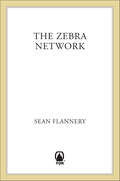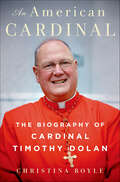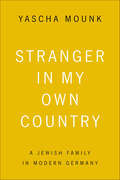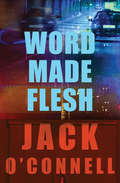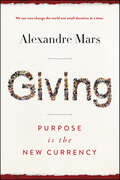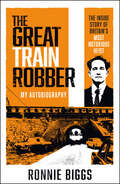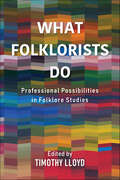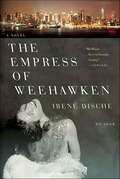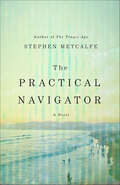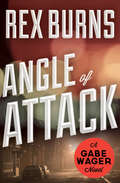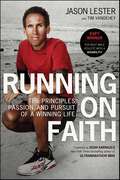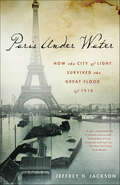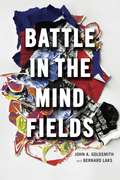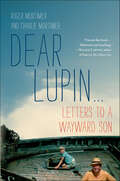- Table View
- List View
"A Third Reich, as I See It": Politics, Society, and Private Life in the Diaries of Nazi Germany, 1933–1939
by Janosch SteuwerWith the beginning of the National Socialist dictatorship, Germany not only experienced a deep political turning point but the private life of Germans also changed fundamentally. The Nazi regime had far-reaching ideas about how the individual should think and act.In "A Third Reich, as I See It" Janosch Steuwer examines the private diaries of ordinary Germans written between 1933 and 1939 and shows how average citizens reacted to the challenges of National Socialism. Some felt the urge and desire to adapt to the political circumstances. Others felt compelled to do so. They all contributed to the realization of the vision of a homogeneous, conflict-free, and "racially pure" society.In a detailed manner and with a convincing sense of the bigger picture, Steuwer shows how the tense efforts of people to fit in, and at the same time to preserve existing opinions and self-conceptions, led to a close intertwining of the private and the political."A Third Reich, as I See It" offers a surprisingly new look at how the ideological visions of National Socialism found their way into the everyday reality of Germans.
Behind the Beautiful Forevers: A Play
by David HareA stage adaptation of Katherine Boo's National Book Award-winning study of life in a Mumbai slumIndia is surging with global ambition. But beyond the luxury hotels surrounding Mumbai airport lies a makeshift slum, Annawadi, full of people with plans of their own. Zehrunisa and her son Abdul aim to recycle enough rubbish to fund a proper house. Sunil, twelve and stunted, wants to eat until he's as tall as Kalu the thief. Asha seeks to steal government antipoverty funds to turn herself into a "first-class person," while her daughter Manju intends to become the slum's first female graduate. But their schemes are fragile; global recession threatens the garbage trade, and another slum dweller is about to make an accusation that will destroy herself and shatter the neighborhood. For Behind the Beautiful Forevers, journalist Katherine Boo spent three years in Annawadi recording the lives of its residents. From her uncompromising book, David Hare has fashioned a tumultuous play on an epic scale.
The Art of Hutting: Live Off-Grid with The Highland Hutter
by Peter MacQueenLiving Off-the-Grid in ScotlandDon’t just experience Scottish history. Live it with The Art of Hutting, the essential beginner’s guide to sustainable living off the grid.Experience Scotland like never before. The Land of the Brave has so much to see and offer, but nothing is more breathtaking than living in its natural beauty. So how does one live away from the cities of Scotland? Inspired by traditional and modern shelter techniques, hutting expert Peter MacQueen shares how to live off the grid in The Art of Hutting. Each chapter answers many your questions about local sustainable living, from the safest bushcraft tools to growing a bountiful garden for every season. That way, you can be prepared to create your forever home and make memories in the untamed heart of Scotland.Create your own cozy Scottish hideaway. Along with learning the necessary outdoor skills to live off Scotland’s resources, this self-sufficient living book also shares how to create the hut of your dream. Off-grid living has never been cozier than with MacQueen’s hutting tips and tricks, from constructing the perfect eco-design to finding natural building materials. And with visual examples of local huts and cottages to choose from, you can create your next home with all the beauty and wonders the Scottish highlands and lowlands have to offer.Inside The Art of Hutting, you’ll also find:Best locations for hut buildingHow to create a wildlife garden made from Scotland’s natural vegetationRecommendations for fire-starter tools and firewood storageIf you liked books such as Thrive, Clansland Almanac, or Surviving the Wild, then you’ll love The Art of Hutting.
Turning Texas Blue: What It Will Take to Break the GOP Grip on America's Reddest State
by Mary Beth RogersIn the 2014 midterm election, Democrats in Texas did not receive even 40 percent of the statewide vote; Republicans swept the tables both in Texas and nationally. But even after two decades of democratic losses, there is a path to turn Texas blue, argues Mary Beth Rogers - if Democrats are smart enough to see and follow it. Rogers is the last person to successfully campaign-manage a Democrat, Governor Ann Richards, to the statehouse in Austin. In a lively narrative, Rogers tells the story of how Texas moved so far to the right in such a short time and how Democrats might be able to move it back to the center. And, argues Rogers, that will mean a lot more of an effort than simply waiting for the state's demographics to shift even further towards Hispanics - a risky proposition at best. Rogers identifies a ten-point path for Texas Democrats to win at the statewide level and to build a base vote that would allow Texas to become a swing-vote player in national politics once again. One part of that shift starts with local Democratic candidates in local Republican communities making the connection between controversial local issues or problems and the statewide Republican policies that ignore or create them. For example, in a 2014 election in Denton-a Republican suburb-voters approved Texas's first ban on hydraulic fracking. The next day, though, a Republican Texas agency official announced that Texas would not honor the town's vote to ban. No democratic candidate picked up the issue. Change won't come easily, argues Rogers. But if Texas shifts to even a pale shade of purple, it changes everything in American politics today.
Puritan Spirits in the Abolitionist Imagination (American Beginnings, 1500-1900)
by Kenyon GradertThe Puritans of popular memory are dour figures, characterized by humorless toil at best and witch trials at worst. “Puritan” is an insult reserved for prudes, prigs, or oppressors. Antebellum American abolitionists, however, would be shocked to hear this. They fervently embraced the idea that Puritans were in fact pioneers of revolutionary dissent and invoked their name and ideas as part of their antislavery crusade.Puritan Spirits in the Abolitionist Imagination reveals how the leaders of the nineteenth-century abolitionist movement—from landmark figures like Ralph Waldo Emerson to scores of lesser-known writers and orators—drew upon the Puritan tradition to shape their politics and personae. In a striking instance of selective memory, reimagined aspects of Puritan history proved to be potent catalysts for abolitionist minds. Black writers lauded slave rebels as new Puritan soldiers, female antislavery militias in Kansas were cast as modern Pilgrims, and a direct lineage of radical democracy was traced from these early New Englanders through the American and French Revolutions to the abolitionist movement, deemed a “Second Reformation” by some. Kenyon Gradert recovers a striking influence on abolitionism and recasts our understanding of puritanism, often seen as a strictly conservative ideology, averse to the worldly rebellion demanded by abolitionists.
The Seventeen Widows of Sans Souci
by Charlotte ArmstrongA middle-aged widow makes a new life in a strange apartment houseNona Henry&’s husband is dead, and with him the life they spent years building in New York City. Unable to bear the Manhattan winter without him, Nona goes west to Pasadena, California, land of sun, sand, and rebirth. She finds a picture postcard advertising a boarding house called Sans Souci and, charmed by the elegant hotel&’s stately patio, makes a one-month reservation. Reality does not live up to the postcard. Sans Souci is dingy, cramped, and dark, a claptrap hotel full of shabby rooms whose windows overlook a run-down neighborhood. But Nona will not give in. Sixteen other widows live in the hotel. Some are lifers, some just passing through. In this eclectic mix of women whose men have gone, Nona finds a niche, and learns that the end of her old life can&’t stop her from beginning again.
The Orchard: A Novel
by Jeffrey StepakoffThe passionate new novel by the author of FIREWORKS OVER TOCCOA.Grace Lyndon is a rising ingenue in the world of perfumes and flavors; a stiletto-wearing, work-a-holic in Atlanta, she develops aromas and tastes to enthrall the senses. Dylan Jackson is a widowed single father whose heart and hands have been calloused in the fields of his North Georgia apple farm. When Grace happens to taste an apple picked from Dylan's trees, it changes both their lives forever. Determined to track down the apple's origin, Grace sets off in the middle of the night where she finds not only a beautiful mountain orchard in the clouds, but the mysterious man who owns it. In Stepakoff's heartbreaking eloquence, their sudden yet undeniable attraction is threatened—leaving readers with a momentous finale that proves Jeffrey Stepakoff is a master craftsman of the heart.
Marrying Up
by Nina FoxxThe Ring Is Not Enough ...... not if, like Paris Montague, you come from a long line of women whoknow how to marry. In her family, the unspoken rule has always been:never wed someone who's not as well off as you, and her mother wants herlast unattached daughter to find a wealthy "Mr. Right" right now.But Paris is doing just fine with her no-strings-attached relationship withher sexy secret lover, Tyson. The man may not have money, but he knowshow to push all the right buttons!Then JaBari Nolan enters the picture -- rich, charming, and oh-so-fine,with definite husband potential. But Paris can't shake the feeling thatthere's something shady going on with the all-too-perfect Mr. Nolan.Time's running out, and Paris is going to have to choose between sweetTyson and seductive JaBari.And maybe "up" is not the way to take it ...
Savage: The Life and Times of Jemmy Button
by Nick HazlewoodA tale of tragedy, catastrophe, and the triumph of the human spirit.In 1830 a Yamana Indian boy, Orundellico, was bought from his uncle in Tierra del Fuego for the price of a mother-of-pearl button. Renamed Jemmy Button, he was removed from his primitive nomadic existence, where life revolved around the hunt for food and the need for shelter, and taken halfway round the world to England, then at the height of the Industrial Revolution. He learned English and Christianity, met King William IV and Queen Adelaide, and made a strong impression on many of the major figures in Britain, eventually becoming a celebrity. Charles Darwin himself befriended the Fuegian and later wrote about their time together on The Beagle, voyaging back to the southern tip of South America. Their friendship influenced one of the most important and controversial works of the century, On the Origin of Species.Upon his return to Tierra del Fuego, Jemmy found that life could never be the same for him there. The Beagle's captain deposited the young man on a lonely, windswept shore and charged him with the tasks of "civilizing" his people and bringing God to his homeland. At first ostracized and attacked by other Fuegians, Jemmy later became the target of zealous and ambitious missionaries. Thirty years after his return, a missionary schooner in Tierra del Fuego was attacked, with nearly everyone on board killed, and Button himself was accused of leading the massacre.In Nick Hazlewood's Savage, Button's life story illustrates how the lofty ideals of imperialism often resulted in appalling consequences. Thoroughly researched and remarkably well written, this fascinating and poignant story is ultimately about survival, revenge, murder, and the destruction of a whole race of people, blurring the boundaries of civilization and savagery.
Sit Down and Shut Up: How Discipline Can Set Students Free
by Cinque HendersonOn his very first day of school as a substitute teacher, Cinque Henderson was cursed at and openly threatened by one of his students. Not wanting trouble or any broken bones, Henderson called the hall monitor, who escorted the student to the office. But five minutes later the office sent him back with a note that read, “Ok to return to class.” That was it: no suspension, no detention, no phone call home, nothing. Sit Down and Shut Up: How Discipline Can Set Students Free is a passionate and personal analysis of Henderson's year as substitute teacher in some of America’s toughest schools. Students disrespected, yelled at, and threatened teachers, abetted by a school system and political culture that turned a willfully blind eye to the economic and social decline that created the problem. Henderson concludes that the failures of our worst schools are the result of a population in crisis: classrooms are microcosms of all our nation’s most vexing issues of race and class. The legacy and stain of race—the price of generational trauma, the cost of fatherlessness, the failures of capitalism, the false promise of meritocracy—played itself out in every single interaction Henderson had with an aggressive student, an unengaged parent, or a failed administrator. In response to the chaos he found in the classroom, Henderson proposes a recommitment to the notion that discipline—wisely and properly understood, patiently and justly administered—is the only proper route to freedom and opportunity for generations of poor youth. With applications far beyond the classroom, Henderson’s experiences offer novel insights into the pressing racial, social, and economic issues that have shaped America’s cultural landscape.Sure to ignite discussion and controversy, Sit Down and Shut Up provides a frank evaluation of the broken classrooms of America and offers a bold strategy for fixing them.
This Is Not My Memoir
by André Gregory Todd LondonThe autobiography-of-sorts of André Gregory, an iconic figure in American theater and the star of My Dinner with AndréThis is Not My Memoir tells the life story of André Gregory, iconic theatre director, writer, and actor. For the first time, Gregory shares memories from a life lived for art, including stories from the making of My Dinner with André. Taking on the dizzying, wondrous nature of a fever dream, This is Not My Memoir includes fantastic and fantastical stories that take the reader from wartime Paris to golden-age Hollywood, from avant-garde theaters to monasteries in India. Along the way we meet Jerzy Grotowski, Helene Weigel, Gregory Peck, Gurumayi Chidvilasananda, Wallace Shawn, and many other larger-than-life personalities.This is Not My Memoir is a collaboration between Gregory and Todd London who create a portrait of an artist confronting his later years. Here, too, are the reflections of a man who only recently learned how to love. What does it mean to create art in a world that often places little value on the process of creating it? And what does it mean to confront the process of aging when your greatest work of art may well be your own life?
The Zebra Network
by Sean Flannery"Look to Washington. Look to Moscow. Zebra One. Zebra Two." These cryptic words, whispered on a dark Moscow street, lead one-time CIA "golden boy" David McAllister on a desperate quest for the truth. Hunted by KGB and CIA alike, McAllister must decipher the riddle in order to unravel an espionage plot so vast that the Free World's fate hangs in the balance—and to prove his own innocence. And he's running out of time . . .
An American Cardinal: The Biography of Cardinal Timothy Dolan
by Christina BoyleThe most powerful Roman Catholic leader in the United States had humble beginnings. Timothy Michael Dolan was born in Maplewood, Missouri in 1950. From an early age, those around him knew that he would become a priest. Through college and seminary, his power and spirituality grew. He was formally ordained in 1976. In 2009, he was made Archbishop of New York. Several months later he was elevated to cardinal. There were clear signs that the ailing Pope Benedict XVI saw him as a bright hope for the future. During the 2013 conclave, Vatican experts seriously wondered if he would be chosen to lead the Catholics of the world. The cardinal's rise is not, however, without its controversies. He was one of the Catholic leaders who dealt, harshly say some, with abusers and the abused in the church's sex scandal. He is a consummate player who doesn't shy away from picking a political battle. Christina Boyle's An American Cardinal is a book about power and the Roman Catholic church today framed by the life of a man who might someday become the first American pope.
Stranger in My Own Country: A Jewish Family in Modern Germany
by Yascha MounkA moving and unsettling exploration of a young man's formative years in a country still struggling with its pastAs a Jew in postwar Germany, Yascha Mounk felt like a foreigner in his own country. When he mentioned that he is Jewish, some made anti-Semitic jokes or talked about the superiority of the Aryan race. Others, sincerely hoping to atone for the country's past, fawned over him with a forced friendliness he found just as alienating. Vivid and fascinating, Stranger in My Own Country traces the contours of Jewish life in a country still struggling with the legacy of the Third Reich and portrays those who, inevitably, continue to live in its shadow. Marshaling an extraordinary range of material into a lively narrative, Mounk surveys his countrymen's responses to "the Jewish question." Examining history, the story of his family, and his own childhood, he shows that anti-Semitism and far-right extremism have long coexisted with self-conscious philo-Semitism in postwar Germany. But of late a new kind of resentment against Jews has come out in the open. Unnoticed by much of the outside world, the desire for a "finish line" that would spell a definitive end to the country's obsession with the past is feeding an emphasis on German victimhood. Mounk shows how, from the government's pursuit of a less "apologetic" foreign policy to the way the country's idea of the Volk makes life difficult for its immigrant communities, a troubled nationalism is shaping Germany's future.
Word Made Flesh (Quinsigamond #4)
by Jack O'ConnellAn ex-cop gets sucked back into an evil world he thought he&’d left behind&“Vealshank&” Tani&’s life ends in an abandoned train station. The killers don&’t just torture Tani, they skin him and hang him from a steal beam as a treat for the carrion eaters. This grisly scene wouldn&’t matter to Gilrein, a cabbie who knows to mind his own business, except that he spent the evening as Tani&’s chauffeur. Whether he knows anything or not, his life is now a liability to August Kroger, kingpin and rare-book addict—and enemies of Kroger do not live long. Before he drove a Checker, Gilrein was a cop, with a life built around the force. His wife wore a badge as well, serving valiantly until the day an explosion took her life and forced Gilrein to abandon their profession. Sensing a connection between Tani&’s death and his wife&’s, Gilrein reopens the case, hoping to expose the conspiracy that ended her life—before it claims his too.
Giving: Purpose Is the New Currency
by Alexandre MarsDubbed “the little French Bill Gates” in his native country, Alexandre Mars quit the startups that made him rich, transforming himself from entrepreneur to philanthropist. Determined to become a responsible and effective giver, Mars traveled around the world, asking two very simple questions. “Do you give to charity?” “Do you give enough?” While all answered yes to the first question, their second answer—“no” surprised him. From Hong Kong to Paris to New York, he met numerous people passionate about making the world a better place, yet unsure of how to do so. Certain there must be a better answer than volunteerism or blank checks, Mars began Epic, a foundation that allows for users to donate directly to rigorously vetted charities while seeing their impact in real time.Epic takes no cut—100 percent of the donations reach the people who need them. In this vital book, Mars not only tells the story of Epic and its new formula for giving but redefines what it means to give and have purpose. Like the millennial generation driving much of today’s change, Giving is about holding the new centers of power—multinational corporations—accountable to society. People are passionate about social causes, and want to donate their time, money, and skills. Combining Mars’ extensive knowledge and experience in tech and economics with the real-life stories of NGOs, Giving provides the inspiration, tools, and insight we can use to make our modern and unpredictable world a better place.100% of the author's proceeds will go the Epic portfolio organizations to help disadvantaged youth.
The Great Train Robber: The Inside Story of Britain's Most Notorious Heist
by Ronnie BigsLife After the Great Train RobberyMeet one of the robbers behind the most daring heist in mid-20th century Britain and what life was like on the run.The man who got away shares his story. 1960s Britain was full of possibilities, especially for a young Ronnie Biggs. Part of the railway group that stole over £50 million from a mail train, one of his most famous crimes eventually lead to a life full of dangerous and exhilarating stories to share. Chris Pickard returns with Biggs’ final farewell in The Great Train Robber, a new bestselling crime biography that sheds new light on one of the most famous British robbers in history. In this book, spanning almost 40 years of exciting escapes, close calls, and an endearing ending to his story, you will discover more about this notorious fugitive from the best source possible: himself.From Britain to Brazil and back again. For the 60th anniversary of the Great Train Robbery, get the inside story of Biggs over his criminal career and personal life. Detailing the fateful day on the mail train, his decades on the run across the seas, being released from prison in 2009, and his peaceful final moments in 2013, The Great Train Robber shares how one railway heist changed not only Biggs’ life, but countless others to this very day.Inside, you’ll learn about Biggs’ global adventures as the most wanted man in the world:Where Biggs went after the train robberyHis great escape from Wadsworth PrisonFleeing to Australia and BrazilSurviving two kidnapping attemptsHis return to BritainIf you enjoy true crime biographies such as The Wager, The Art Thief, or The Best New True Crime Stories: Well-Mannered Crooks, Rogues, and Criminals, then you’ll love The Great Train Robber.
What Folklorists Do: Professional Possibilities in Folklore Studies
by Timothy LloydWhat can you do with a folklore degree? Over six dozen folklorists, writing from their own experiences, show us. What Folklorists Do examines a wide range of professionals—both within and outside the academy, at the beginning of their careers or holding senior management positions—to demonstrate the many ways that folklore studies can shape and support the activities of those trained in it. As one of the oldest academic professions in the United States and grounded in ethnographic fieldwork, folklore has always been concerned with public service and engagement beyond the academy. Consequently, as this book demonstrates, the career applications of a training in folklore are many—advocating for local and national causes; shaping public policy; directing and serving in museums; working as journalists, publishers, textbook writers, or journal editors; directing national government programs or being involved in historic preservation; teaching undergraduate and graduate students; producing music festivals; pursuing a career in politics; or even becoming a stand-up comedian. A comprehensive guide to the range of good work carried out by today's folklorists, What Folklorists Do is essential reading for folklore students and professionals and those in positions to hire them.Audio book narrated by Walter Brown. Produced by Speechki in 2021.
The Empress of Weehawken: A Novel
by Irene DischeAt the end of what is (she cannot help observing) an extraordinary life, Elisabeth Rother has decided to write her memoirs. She brushes aside her narrow escape with her Jewish husband from the Nazis, and the perilous voyage to the New World of New Jersey. The subject that really consumes her is the waywardness of her impossible daughter, Renate, and her granddaughter, Irene.Renate performs autopsies on the bodies of politicians whom death has harvested in the nighttime arms of their mistresses. Worse, she sleeps on unironed sheets. Irene drops out of school to roam the world, refuses to correct her nose with plastic surgery, and shows alarming signs of enjoying sex. What is to be done with such women?A curiously touching love letter to the difficult but sustaining love of mothers and daughters, The Empress of Weehawken is a masterpiece of comedy with an unexpected lilt of redemption at its close.
The Practical Navigator: A Novel
by Stephen MetcalfeMichael Hodge has been many things in life. A surfer. A husband. A father. A son. A business owner. A lover. Abandoned.Ever since Michael’s wife, Anita, ran off leaving him to raise their child on his own, he has been struggling to pick up the pieces. And after seven years, he’s finally starting to put his life back together. He has given up his dream of surfing and now manages his own construction business, he works hard to be the best father possible to his autistic son, and he’s falling for a new woman. But when Anita returns to town unannounced wanting to be a part of their lives again, and his mother begins showing early signs of Alzheimer’s, Michael’s carefully reconstructed world begins to fall apart. Now, Michael must decide whether or not to give Anita a second chance or to protect his son, and himself, from being hurt yet again.With pitch perfect emotion and a beautiful portrayal of the relationship between a father and son, Stephen Metcalfe has drawn a rich and layered portrait of what it means to be a family and what it means to be truly loved.
Angle of Attack (The Gabe Wager Novels #4)
by Rex BurnsA tip about a murdered mob boss forces Gabe Wager to reopen a cold caseA year ago, Marco Scorvelli was murdered while picking up his morning paper. A sawed-off shotgun put a hole in his stomach, and streaked the inside of his sports coat with the mob boss&’s innards. As Scorvelli crawled towards his front door, the killer left the shotgun angled neatly on the sidewalk. No prints were recovered, and no headway was ever made on the case. Now a reliable underworld source passes a message to homicide detective Gabe Wager. The killing wasn&’t ordered by a rival family, but by Scorvelli&’s brother, in an attempt to take control of the organization. After a year of peace, a war is about to erupt between Denver&’s Italian and Hispanic crime syndicates, and Gabe Wager will be in the middle, trying to keep the city from burning to the ground.
Running on Faith: The Principles, Passion, and Pursuit of a Winning Life
by Jason Lester Tim Vandehey“Whatever burden you carry (and we all have one) this story will point you to strength beyond yourself. Read it twice!” —John Ortberg, author and pastor, Menlo Park Presbyterian Church“Running on Faith is a triumph! Jason Lester is proof that as one wise man said, ‘Triumph is when you try and add a little umph!’ Jason Lester shows us ALL that you can achieve whatever you put your mind body and soul into!”—Rev Run, author of Words of Wisdom: Daily Affirmations of Faith from Run’s House to Yours“Jason’s story is a must read! It is a true testimony of the human spirit and confirmation that we all have so much more in us than we may believe. The challenges he conquered will create a shift in your life”—Tyrese Gibson, singer and actorJason Lester is a disabled ultra-endurance athlete and winner of ESPN’s 2009 ESPY Award for “Best Disabled Male Athlete.” He tells his remarkable story in Running on Faith, offering readers an inspirational guide to overcoming adversity, reaching your goals, and recognizing God’s guiding hand in your life.
Paris Under Water: How the City of Light Survived the Great Flood of 1910
by Jeffrey H. JacksonIn the winter of 1910, the river that brought life to Paris quickly became a force of destruction. Torrential rainfall saturated the soil, and faulty engineering created a perfect storm of conditions that soon drowned Parisian streets, homes, businesses, and museums. The city seemed to have lost its battle with the elements. Given the Parisians' history of deep-seated social, religious, and political strife, it was questionable whether they could collaborate to confront the crisis. Yet while the sewers, Métro, and electricity failed around them, Parisians of all backgrounds rallied to save the city and one another. Improvising techniques to keep Paris functioning and braving the dangers of collapsing infrastructure and looters, leaders and residents alike answered the call to action. This newfound ability to work together proved a crucial rehearsal for an even graver crisis four years later, when France was plunged into World War I. On the occasion of the hundredth anniversary of the flood, Jeffrey H. Jackson captures here for the first time the drama and ultimate victory of man over nature.
Battle in the Mind Fields
by John A. Goldsmith Bernard Laks“We frequently see one idea appear in one discipline as if it were new, when it migrated from another discipline, like a mole that had dug under a fence and popped up on the other side.” Taking note of this phenomenon, John Goldsmith and Bernard Laks embark on a uniquely interdisciplinary history of the genesis of linguistics, from nineteenth-century currents of thought in the mind sciences through to the origins of structuralism and the ruptures, both political and intellectual, in the years leading up to World War II. Seeking to explain where contemporary ideas in linguistics come from and how they have been justified, Battle in the Mind Fields investigates the porous interplay of concepts between psychology, philosophy, mathematical logic, and linguistics. Goldsmith and Laks trace theories of thought, self-consciousness, and language from the machine age obsession with mind and matter to the development of analytic philosophy, behaviorism, Gestalt psychology, positivism, and structural linguistics, emphasizing throughout the synthesis and continuity that has brought about progress in our understanding of the human mind. Arguing that it is impossible to understand the history of any of these fields in isolation, Goldsmith and Laks suggest that the ruptures between them arose chiefly from social and institutional circumstances rather than a fundamental disparity of ideas.
Dear Lupin: Letters to a Wayward Son
by Roger Mortimer Charlie Mortimer"Among the funniest [letters] ever dispatched in the vain hope of steering a black sheep onto something like the straight and narrow." —The Wall Street JournalNostalgic, witty, and original, Dear Lupin by Roger Mortimer and Charlie Mortimer tracks the entire correspondence between a father and his only son. When the book begins, Charlie, the son, is studying at Eton, although the studying itself is not a priority, much to his father's chagrin. After Charlie graduates and moves from South America to Africa and eventually back to London, Roger continues to write regularly, offering advice (which is rarely heeded) as well as humorous updates from home ("Your mother has had the flu. Her little plan to give up spirits for Lent lasted three and a half days"). Roger's letters range from reproachful ("You may think it mildly amusing to be caught poaching in the park; I would consider it more hilarious if you were not living on the knife edge") to resigned ("I am very fond of you, but you do drive me round the bend"), but his correspondence is always filled with warmth, humor, and wisdom that offers unique insight into the relationship between father and son.
